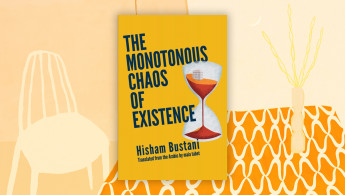The Monotonous Chaos of Existence: Flipping the script on short storytelling
Hisham Bustani’s collection of short stories The Monotonous Chaos of Existence, translated brilliantly by Maia Tabet, is a rebellion against short fiction convention through incomplete exchanges and letters, surrealism, autofiction, comics and textual and photographic archives. It is also a reflection of his ideas and the questions preoccupying him about the contemporary Arab world and its remote past.
The collection of sixteen stories is divided into three parts: Disturbance, Gaza and Like a Dream, each part containing short stories under the same theme. However, despite their division into thematic parts, they still defy categorization in their scope displayed by the employment of unconventional forms and structures, and by having mostly unnamed characters, different settings, and jumps in time and space.
"Hisham Bustani wants to convey the impossibility of pinning down the contemporary state of the Arab world, and to reveal his haunting thoughts about its predicament"
In doing so, Hisham Bustani wants to convey the impossibility of pinning down the contemporary state of the Arab world and to reveal his haunting thoughts about its predicament. From the personal to the universal: love, freedom, the place and role of artists and intellectuals, landscape changes, colonialism, postcolonialism and ecological problems.
This is displayed in the first story City Nightmares as the reader is immediately ushered into a surrealist text that is primarily concerned about the change in Amman’s landscape, a change against which the main character - full of idealism - is hopelessly and helplessly left standing, with her only possible reaction is waiting: “For the bus stop where the bus never comes,” she replies, out of breath.
|
The writer continues his break from the traditional literary conventions to reflect on other subjects too. He uses archives – photographs, ancient texts and real events – to talk about the painful past of Arab countries, especially Palestine, and to inform facts and ideas surrounding postcolonialism.
And while the archives are factual in nature, their effect is the opposite. Indeed, they rather add an effect of surrealism to the collection and make the readers question how could such things happen in the rational realm. How could human suffering caused by occupation stretch for so long? This particular frustration is conveyed through the short story Crossing - based on the real attempt of Jordanian writers and artists (including the writer) to enter Gaza through the Egyptian Rafah crossing in 2009.
Hisham Bustani uses other inventive short storytelling devices such as repetition and juxtaposition to talk about lingering civil conflicts, harmful technology and ecological problems. For example, the beauty of nature is contrasted with the planes of death: “The blue sky is streaked with the F-16’s white trails and birds scatter from the rush of warm air produced by the rotors of the Apache helicopters,” described in the story Etched in White. In the short stories Faysali and Wehdat, Stardust, and Solitude, the writer reflects on how the problems seem to stretch and escalate, especially with new players entering the geopolitical arena.
The place and role of artists and intellectuals in the Arab world is another major theme that recurs throughout the collection. Quantum Leap, intellectuals, and Paper on Table Next to Overturned Chair are the main stories in which the writer examines the meaning of making art in this time and place – is art an act for political freedom? Or a form of escapism?
The writer doesn’t break from his rebellion on traditional storytelling to reflect upon the more personal subjects such as love, marriage and freedom either. This is displayed in his use of poetry as well as major jumps in time and space. For example, in Orchestra and Vodka at the Seaside he blurs the lines between lovemaking and poetry. But perhaps the short story that embodies the writer’s reticence to follow traditional conventions is Paper on Table Next to Overturned Chair, where the voice refuses and rejects labels outright.
In the end, the collection’s title is The Monotonous Chaos of Existence literally al-Fawda al-Ratiba lil-Wujud in Arabic is not a surprise. Life becomes monotonous in its continuous problems and conflicts in the contemporary Arab world where chaos still reigns, and art and writing often seem futile in its face.
Still, there are no better means to order the chaos of existence than art and writing, something Hisham Bustani does well in this collection from the Mason Jar Press.
Saliha Haddad is an Algerian journalist, writer, teacher, and literary agent.
Follow her on Twitter: @sallyhad3



